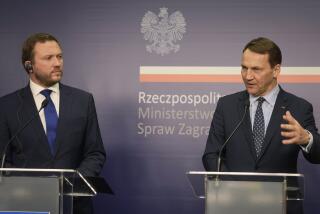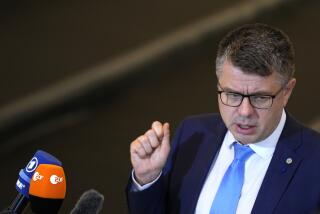Christopher Prods Baltics on Behalf of Their Minority Russians : Diplomacy: He sees officials of Latvia, Estonia and Lithuania. U.S. fears Moscow might respond to ill treatment by invading.
- Share via
RIGA, Latvia — Secretary of State Warren Christopher, seeking to calm an explosive issue that has fanned extremist nationalism in Russia, called on the governments of the three Baltic republics Wednesday to give better treatment to their embattled ethnic Russian minorities.
“We urge the Latvian government and the other governments to act generously on this issue,” Christopher said after meeting with the foreign ministers of Latvia, Estonia and Lithuania. “We want to pursue this issue very vigorously.”
About 870,000 of Latvia’s 2.6 million people, or slightly more than a third, are ethnic Russians, and their fate in the newly independent republic has become a major issue of concern to nationalist groups across the border in Moscow and St. Petersburg.
Latvia has denied citizenship to most of the Russians because they settled in the country after Josef Stalin’s troops occupied it in 1940. As non-citizens, the Russians are prohibited from owning land or firearms. And a language law requiring businesses to use Latvian has made it more difficult for Russian-speakers to find jobs.
As a result, nationalist groups in Russia have demanded that the government of President Boris N. Yeltsin act to protect their compatriots, along with ethnic Russians in neighboring republics where civil strife has broken out, such as Georgia and Tajikistan.
The issue worries American officials, who fear that the mistreatment of ethnic Russians might someday give Moscow a plausible excuse for sending troops across its borders.
Already, Russian Defense Minister Pavel S. Grachev has warned that the controversy may delay the promised withdrawal of Russia’s remaining 17,000 troops in Latvia.
“We will stay there until these problems are solved,” he said last week.
Accordingly, Christopher made a point of stopping in Latvia at the end of a weeklong trip through the former Soviet Union--and made a point of meeting with leaders of the ethnic Russians to show his concern for their welfare.
Alexei Grigoriev, a journalist who has served as a spokesman for the ethnic Russians, told Christopher that his people want the United States to mediate with the Latvian government.
“There’s no shooting in the streets,” he said. “ . . . But there are tendencies of deterioration that are very alarming, and I think we should act promptly.”
Christopher did not offer U.S. mediation, aides said, but he did propose sending an American diplomat to head an international team to review the Latvian citizenship law--a proposal Latvia promptly accepted.
“There’s no argument” from the Baltic governments, a Christopher aide said. “They understand that their governments have to meet a certain international test on citizenship and minority rights.”
Christopher also reaffirmed the Clinton Administration’s insistence that all remaining Russian troops withdraw from Latvia and Estonia as soon as possible, and said the United States rejects any suggestion of a link between the troop withdrawal and the ethnic minorities issue.
Russia once had more than 100,000 troops in the three Baltic countries, but it withdrew the last units from Lithuania last summer and has reduced its force in Estonia to about 3,500.
But Latvia--where the largest number of troops was garrisoned, where the Soviet Baltic fleet was headquartered and where many retired Russian naval officers have settled--still has an estimated 17,000.
The issue is further complicated by the presence in Latvia of several important Russian military facilities, including a major early-warning radar base at Skrunda that serves Moscow’s defense system against nuclear missiles.
The United States has quietly urged the Latvians to compromise on that issue by allowing the Russians to keep operating the base under a government-to-government agreement, one official indicated.
“We think that’s something to be worked out between the Russian and Latvian governments,” Christopher said.
More to Read
Sign up for Essential California
The most important California stories and recommendations in your inbox every morning.
You may occasionally receive promotional content from the Los Angeles Times.














